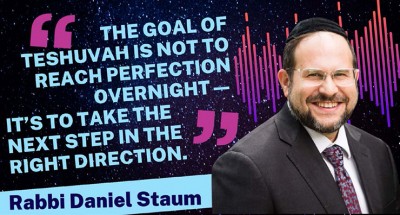
As Yom Kippur approached, Rabbi Daniel Staum, a noted mechanech, therapist, and longtime Rav, joined Chazaq’s Torah Talks to reflect on the power of resolutions, the challenges of consistency, and the timeless gift of teshuvah.
Rabbi Staum opened with a story: just before his son left for Eretz Yisrael, he discovered an app called FlightRadar24 that tracks every plane’s trajectory. He watched in fascination as his son’s flight arched toward Greenland before curving back toward Europe. That arc, he explained, mirrors Elul and Tishrei—a spiritual jet stream that propels us forward. When everyone around us is focused on teshuvah, the momentum carries us along. The Baal HaTanya’s image of the King in the Field captures this moment: Hashem leaves the palace, and every Jew can approach Him directly.
This duality, Rabbi Staum explained, is why the Yamim Nora’im are marked by shifting emotions—marching songs of majesty followed by the trembling verses of Unesaneh Tokef. Fear of judgment does not push us away from G-d; it draws us closer. “From You I flee, to You I run,” he said, recalling how his children once hid behind his leg while playing monster. Fear sends us into the very embrace of our Father in Heaven.
The rabbi shared another mashal: a student library once tried charging him $325 in late fees for forgotten cassette tapes. He refused, paying only for the tapes themselves. That, he said, is the gift of Yom Kippur. If our sins accumulated without limit, the burden would be unbearable. Instead, Hashem gives us a clean slate each year—not just to “try again,” but to rebuild our relationship with Him.
So why do resolutions often fail? Rabbi Staum recounted the all-too-relatable tale of a man who wrote a new list of kabbalos on Yom Kippur—only to find last year’s list tucked into his machzor, identical to this year’s. The yetzer hara, he explained, tricks us in two ways. Sometimes it tells us to take on too much, leaving us overwhelmed by Cheshvan. Other times, it belittles our efforts, whispering, “That’s all you’re doing?” The key is balance: a broad, general goal and one small, specific, practical step. Even five minutes of focused effort, consistently repeated, keeps the flame alive. Writing it down adds permanence. And most important: when we stumble, we start again. Failure is not final—it’s part of the journey.
On procrastination, Rabbi Staum emphasized that it is not laziness but anxiety. Big changes feel overwhelming, so we push them off, only to increase our anxiety further. The antidote is Rabbi Dessler’s wisdom: small, gradual steps. Growth is a ladder—one rung at a time. Success breeds success, and even one week of progress counts. The yetzer hara wants us to believe that if we cannot do everything, we should do nothing. But every step forward matters.
Turning to forgiveness, Rabbi Staum dismantled the shallow “mass text” apology. True mechilah requires humility, sincerity, specificity, and responsibility. A vague “sorry for anything I might have done” rebuilds nothing; a heartfelt recognition of another’s dignity restores what was lost. The act of apology itself is a restoration of ego: “I hurt you, but you matter to me.”
For his closing thought, Rabbi Staum turned to Yom Kippur itself. Why do we scream Baruch Shem aloud on the night of Kol Nidrei, when we are full, and whisper it after Ne’ilah, when we are angelic? Because in ruchniyus, it is not where you are, but where you are heading. On Yom Kippur night, though physically satisfied, our thoughts are directed wholly to Hashem. After Ne’ilah, even in our holiness, our minds wander to the break-fast. Spirituality is measured by direction, not current state.
He likened this to trains leaving Chicago—one bound for New York, the other for San Francisco. At the platform they are 20 feet apart; moments later, they are 3,000 miles apart. So too with us: the critical choice is direction. Are we on the track toward Hashem?
Rabbi Staum concluded with the words of Rav Levi Yitzchak of Berditchev, who would tell himself each year: “This year, I truly mean it.” Last year, he meant it too—but the beauty is in trying again. Like a construction zone on the highway, even if traffic slows, the sign “men at work” tells us the future will be better. Hashem does not demand perfection, only progress. Each sincere step matters.
Rabbi Yaniv Meirov is the CEO of Chazaq and Rav of Congregation Charm Circle in Kew Gardens Hills. Since 2006, he has helped thousands of Jews reconnect with their faith through community events, lectures, and public school outreach, earning recognition from gedolim, elected officials, and community leaders for its impactful work. As Chazaq Torah Talks recently aired its 214th episode with Manny Behar, Rabbi Meirov continues to bring thoughtful, heartfelt conversations to the Jewish world—bridging tradition with today’s challenges, one episode at a time. The Rav can be reached for comment at This email address is being protected from spambots. You need JavaScript enabled to view it..
New Year’s Resolutions With Rabbi Dani Staum
Typography
- Smaller Small Medium Big Bigger
- Default Helvetica Segoe Georgia Times
- Reading Mode




